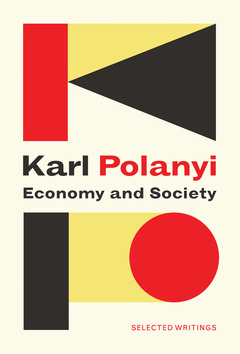Description
Economy and Society: Selected Writings
Author: Polanyi Karl
Coordinators: Thomasberger Claus, Cangiani Michele
Language: English
Subject for Economy and Society: Selected Writings:
Keywords
Karl Polanyi, economics, society, markets, capitalism, political philosophy, economic philosophy
Publication date: 07-2018
280 p. · 15.2x22.9 cm · Paperback
Publication date: 07-2018
280 p. · 15.2x22.6 cm · Hardback
Description
/li>Contents
/li>Readership
/li>Biography
/li>
This book brings together Polanyi?s most important articles and essays to give a unique selection of his essential shorter writings, mixing classic texts with significant but previously little-known pieces. It highlights the coherence and richness of Polanyi?s theoretical and political approach, making it indispensable for understanding his overarching intellectual contribution. The volume includes his interwar writings, which deal with the world economic crisis and the socialist alternative to conservative and fascist developments; his reflection on political theory and the international situation after the war; and his comparative studies of economic institutions. Polanyi?s political writings are complemented and supported by the critique of economic determinism and what he termed ?our obsolete market mentality?.
This book is an invaluable companion to Polanyi?s masterpiece, The Great Transformation, and an essential resource for students and scholars of political economy, sociology, history and political philosophy.
Acknowledgements vii
Introduction by Michele Cangiani and Claus Thomasberger 1
Part I Red Vienna 13
1 On Freedom 15
2 New Reflections Concerning our Theory and Practice 41
3 The Functionalist Theory of Society and the Problem of Socialist Economic Accounting 51
Part II The World Economic Crisis and The Rise of Fascism 59
4 Economy and Democracy 61
5 The Mechanism of the World Economic Crisis 66
6 The Essence of Fascism 81
7 The Fascist Virus 108
Part III On Marx and the Christian Roots of Western Civilization 123
8 Fascism and Marxism 125
8.1 Fascism and Marxian Terminology 125
8.2 Marxism Re-Stated 129
9 Marx on Corporativism 135
10 Community and Society. The Christian Criticism of our Social Order 144
11 Christianity and Economic Life 154
Part IV The Great Transformation, Political Philosophy and Democracy 165
12 Jean-Jacques Rousseau, or Is a Free Society Possible? 167
13 Common Man’s Masterplan 177
14 The Meaning of Parliamentary Democracy 187
15 Our Obsolete Market Mentality. Civilization Must Find a New Thought Pattern 197
Part V Alignments on the International Stage 213
16 Why Make Russia Run Amok? 215
17 British Labour and American New Dealers 226
18 Universal Capitalism or Regional Planning? 231
Part VI Towards a Comparative Study of Economic Institutions 241
19 On Belief in Economic Determinism 243
20 The Livelihood of Man, Introduction 251
21 The Economistic Fallacy 263
22 The Two Meanings of Economic 275
23 The Economy Embedded in Society 290
Postscript 299
24 Hamlet 301
Notes 314
Index 327
Claus Thomasberger is Professor at the University of Applied Science Berlin.
Michele Cangiani is Professor at the Ca' Foscari University of Venice.




